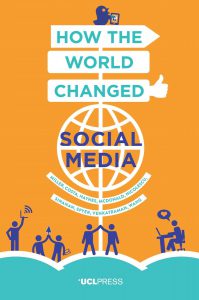
This blog features reading recommendations for the Digital Culture BA 2020-21 modules. It was produced in July 2020 specifically for students joining the course in September 2020. Although it was up-to-date at the time it was produced, some changes to modules, courses and teaching staff may occur. Please make sure you check our website (https://www.kcl.ac.uk/ddh) or contact us directly for the very latest information before you commit yourself to any of our courses.

Introduction to Digital Culture (Rafal Zaborowski)
Cobbe, J. (2018). The problem isn’t just Cambridge Analytica or Facebook – it’s “surveillance capitalism”. Open Democracy.
Schneier, B. (2015). How we sold our souls – and more – to the internet giants. Guardian.
Hieber, P. (2015) “Is social media making us all the same?” Pacific Standard, Feb 5, 2015.
Baym, N. (2018). “How music fans built the internet” (excerpt from Playing to the Crowd: Musicians, Audiences, and the Intimate Work of Connection, New York: NYU Press). Wired.com.
Hsu, Hua (2017) Stuart Hall and the Rise of Cultural Studies, The New Yorker, July 17, 2017.

Introduction to Popular Culture Readings (Sophie Bishop)
Burgess, J. & Green, J. (2018). YouTube Participatory Culture and Digital Society.
Leaver, T., Highfield, T., & Abidin, C. (2020). Instagram: Visual Social Media Cultures. John Wiley & Sons.
Crystal Abidin’s on Microcelebrity (2018): Internet Celebrity: Understanding Fame Online.
Lawson, C. (2020). Skin deep: Callout strategies, influencers, and racism in the online beauty community. SAGE Journals, February 12, 2020.
Paasonen, S., Jarrett, K., & Light, B. (2019) The NSFW book (on sex, humour and risk in social media).

Introductory Digital Methods (Dr Elisa Oreglia, Lecturer in Global Digital Cultures)
For methods, I’d recommend that you browse the Why We Post website and look at videos, browse the main book: Miller, D. et al. (2016). How the World Changed Social Media. UCLPress., and pick a book from a country you’re interested in.
Also, Fry, H. (2019). “What Statistics Can and Can’t Tell Us about Ourselves.” The New Yorker, September 2.
I also recommend you watch Ellen Isaac’s talk on ethnography (2013), TedxBroadway.

Introductory to Digital Capitalism (Nick Srnicek)
Boutang, Y. M. (2012). Cognitive Capitalism. Cambridge: Polity Press.
Huws, U. (2014). Labor in the Global Digital Economy: The Cybertariat Comes of Age. New York: Monthly Review Press.
Srnicek, N. (2016). Platform Capitalism. Cambridge: Polity Press.
Zuboff, S. (2019). The Age of Surveillance Capitalism: The Fight for a Human Future at the New Frontier of Power. London: Profile Books.
Read More:
For more information on Digital Culture at Kings, check out the Digital Culture BA Course.
For a student perspective, you can also read Raissa’s blog, What is Digital Culture BA?

Leave a Reply